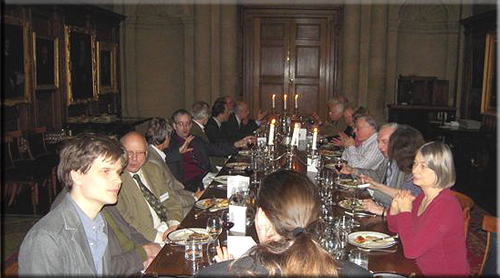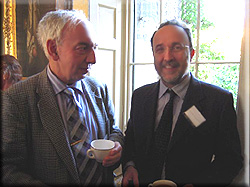ICHM Co-Sponsored Symposium on "Unreasonable Effectiveness"? Historical Origins and Philosophical Problems for Applied Mathematics
By Benjamin Wardhaugh
The history of mathematics and the philosophy of mathematics are both well-established disciplines, but for each, applied mathematics represents a somewhat neglected area, in which basic questions remain to be asked and answered. It is far from obvious what we mean by an 'application' of mathematics; it is far from self-evident that such applications must reliably be effective, or that they should have arisen historically as a result of specific cultural conditions or developments in pure mathematics. Indeed, the whole concept of a division between pure and applied mathematics is a relatively late arrival on the historical scene, yet discussion of either its historical origins or its philosophical problems has been comparatively rare.
This symposium, which brought together a group of leading scholars from three continents, looked in depth at these issues, covering historically the period of the seventeenth and eighteenth centuries when applied mathematics came into being, and examining the philosophical issues which its emergence raises. The papers included a number of detailed historical case studies as well as wider-ranging historical and philosophical reflections; they were organised into five sections.

In Part I, 'Mathematics at work,' Domenico Bertoloni Meli (United States) spoke on myology (the anatomy of muscles), and Kirsti Andersen (Denmark) on perspective. In each case the negotation between authority and practice or experiment revealed the meaning assigned to mathematics in practical contexts.
Part II, 'Social histories' was unfortunately affected by the absence of one of the speakers, who was prevented from attending at the last minute. Shelley Costa (United States) spoke about 'How early eighteenth-century mathematical applications illuminate truth as social process,' exploring the ways in which physical and mathematical truth was established through social processes in the early eighteenth century: why did (and does) 'practical' problem-solving without recourse to proof continue to be depicted as weaker or less true than Euclidean methods of demonstration?
Part III examined the concepts of ratio and analogy, important ones for the emergence of the 'mathematical model.' Benjamin Wardhaugh (United Kingdom) discussed 'analogy' and mathematical models from Francis Bacon to the Newtonians, while Antoni Malet (Spain) considered Isaac Barrow's criticism of Hobbes and Wallis on ratio and proportionality. Newton and Newtonianism have a vital place in any study of the first modern applications of mathematics to the physical world.
In Part IV, 'Mechanics and dynamics,' speakers examined three aspects of what has been called the 'Newtonian revolution.' First, Michael Nauenberg (United States) discussed the evolution of the conceptual framework of orbital dynamics and the place of one new mathematical concept—curvature—within it. Second, Niccolò Guicciardini (Italy) investigated Johann Bernoulli's writings against Newton and his acolytes, focusing on Bernoulli's critical analysis of the Newtonian approach to central force motion and revealing the different agendas endorsed by the group based in Oxford, Cambridge, and London whose leader was Newton, and the group scattered in Europe whose main representatives were Leibniz and Bernoulli. Third, Helmut Pulte (Germany) surveyed the different functions and features of mathematics in the rational mechanics of the eighteenth century, through an examination of analytical mechanics.

In the final part, 'philosophies,' we heard philosophical reflections on the problems raised both in the early modern period and in the present by applied mathematics. Mark Wilson (United States) reflected on the nature and the implications of mathematical 'application' in the thought of Leibniz; Alan Baker (United Kingdom) turned on its head Eugene Wigner's classic questioning of the 'unreasonable effectiveness of mathematics' from which the conference took its title, investigating mathematical ontology and its implications for applied mathematics. Finally, Mark Colyvan (Australia) surveyed the 'philosophical problem' of applied mathematics from a modern perspective.